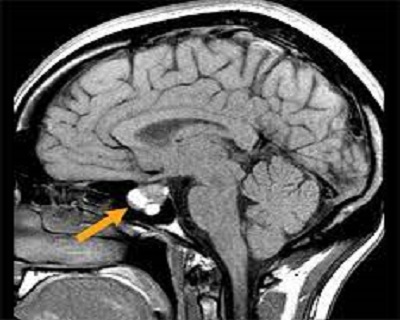Pituitary Tumor

A pituitary tumor is an abnormal growth in the pituitary gland, located at the base of the brain. These tumors can disrupt hormonal balance and lead to symptoms such as headaches, vision problems, and hormonal irregularities. Treatment options vary depending on the tumor's type and size, ranging from medication to surgery.
A pituitary tumor is an abnormal growth that develops within the pituitary gland, a small, pea-sized gland located at the base of the brain. These tumors can be either benign (noncancerous) or malignant (cancerous). The pituitary gland plays a crucial role in regulating hormone production, so pituitary tumors can disrupt hormonal balance in the body. Here are some key points about pituitary tumors:
Causes: The exact cause of pituitary tumors is often unknown. Some may be related to genetic factors or certain medical conditions.
Types: Pituitary tumors can be classified based on their hormone-secreting behavior. Functioning tumors produce excessive hormones, leading to specific symptoms, while non-functioning tumors do not secrete hormones but can cause symptoms due to their size and pressure on surrounding structures.
Symptoms: The symptoms of pituitary tumors can vary widely depending on their size and hormone secretion. Common symptoms include headaches, vision problems, hormonal imbalances (e.g., changes in menstruation or sexual function), and in some cases, neurological issues.
Diagnosis: Diagnosis typically involves a combination of imaging studies (MRI or CT scans) and blood tests to assess hormone levels. A biopsy may be performed in certain cases to confirm the tumor's nature.
Treatment: Treatment options for pituitary tumors include medication, surgery, radiation therapy, or a combination of these approaches. The choice of treatment depends on the tumor's type, size, location, and the patient's overall health.
Pituitary tumors are generally slow-growing, and many are benign. Early diagnosis and appropriate treatment can help manage symptoms and prevent complications associated with hormonal imbalances or pressure on adjacent structures in the brain.
What Our Patients Say
Aliquam a augue suscipit, luctus neque purus ipsum neque dolor primis libero at tempus, blandit posuere ligula varius congue cursus porta feugiat


“Dr.Gourav jatav sir is really good doctor by profession , knowledge and experience. He is very friendly and polite. Always give best opinion and treatment without caring about money.”


“Dr.Gourav jatav sir is really good doctor by profession , knowledge and experience. He is very friendly and polite. Always give best opinion and treatment without caring about money.”


“Got best suggestions got relief spine problem without surgery within a 15 days of time I was suffering from last 3 years
Thanku doctor”


“Very polite, humble, listen to complains patiently and best is he advise surgery only when required.
Less tablets to eat.”


“Dr.gorav sir is the best me abhari hu aapka jo aapne mujhe nai jindgi di aap ka ahshan kabhi nahi bhul sakta har mahine aapse milne aana mera kartvya he aapke per chhune jarur aaunga sir bahut bahut dhanyawad aapka dil se sir”


“Best Surgeon , Thank you very much Dr. Gourav. Papa is is almost fine . On only 8% expectation you did it to save him. We are very thankful of you. May god always bless you Dr. And you are also not less than a god.”